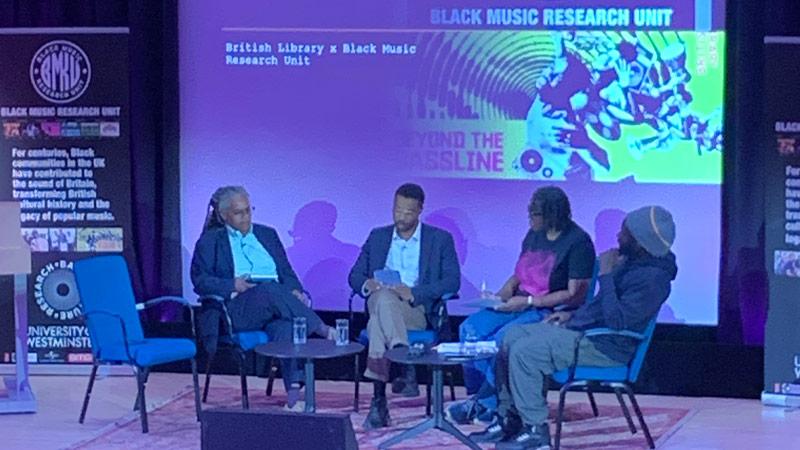The Black Music Research Unit (BMRU), part of the Centre for Research and Education in Arts and Media (CREAM) at Westminster, collaborated with the British Library for the first annual Black British Music Symposium on 12 July. The day saw many people from academics to industry partners unite to explore the history and cultural significance of Black British music.

Held in the British Library, the event was open to the public and gave people the opportunity to listen to presentations from academics, music researchers and business music organisations who discussed a range of topics related to Black British music. Topics included defining and interrogating the concept of Black British music, representation, curation and the archiving of Black British music, exploring intersections, gender dynamics and the portrayal and future of Black British music.
The day consisted of panel discussions on methodologies and approaches as well as Black British musical geographies. There was also a publishing roundtable on how Black British music has been depicted in the media. Award-winning singer, songwriter and composer as well as the President of the Performing Right Society (PRS) Michelle Escoffery was the event’s keynote speaker and she delivered a session on the nuances of being a Black woman in the music industry, as well as the challenges that Black British artists face. Other speakers included Dr E Falade, a Black queer feminist DJ, author, ethnomusicologist and PhD researcher specialising in Black Popular music studies, R&B/Jazz singer and writer Estee Blue, and cultural historian Dr Holly-Gale Millette.
Attendees were also invited to explore the acclaimed exhibition, Beyond the Bassline: 500 Years of Black British Music, an exhibition celebrating centuries of African and Caribbean musical contributions to the UK. Traversing musical genres, from classical, gospel and jazz through to reggae, jungle and afroswing, Beyond the Bassline charts the influence of Black British musicians, creatives and entrepreneurs on popular music since the 16th-century. It also considers the role emerging technologies and the internet have played in creating, listening to and sharing music. It is powered by The British Library’s sound archive, one of the largest collections of sound recordings in the world.
Lastly, attendees were given the opportunity to join the curators, Senior Lecturer, Principal Investigator for the Bass Culture Research and Director for the BMRU Mykaell Riley, and Public Historian and alumna from Warwick University Dr Aleema Gray, for a Carnival Warm-up and Soca Special evening party with a live performance by Soca artist Triniboi Joocie who was accompanied by other DJs.
Research Associate at the BMRU Lizzie Bowes said: “We were overwhelmed by the turnout and engagement with our annual Black British Symposium, held in collaboration with the British Library on 12 July. To facilitate conversations between academics from across the world, and to bring together scholars and community practitioners, was a. tremendous honour. The BMRU has always prided itself on disrupted rigid academic spaces and demolishing the ivory tower of academia, and we were so pleased to interweave performances by Westminster Music department students, as well as live music and opportunities for discussion and networking, into the conventional conference format. It was a fantastic day, and we look forward to continuing the conversations and connections sparked.”
This symposium and exhibition contribute to the United Nations Sustainable Development Goals (SDG) 4: Quality Education and 10: Reduced Inequalities. Since 2019, the University of Westminster has used the SDGs holistically to frame strategic decisions to help students and colleagues fulfil their potential and contribute to a more sustainable, equitable and healthier society.
Find out more about Beyond the Bassline and more events and news on the Black History Year webpage.
Learn about Music courses at the University of Westminster.








